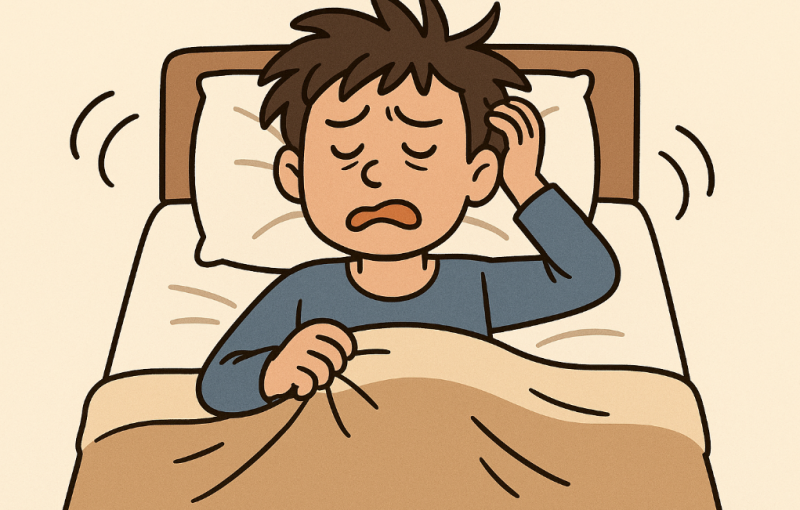
Even at a Whisper, Screams Jolt Your Sleeping Brain
by Jon Scaccia May 27, 2025TL;DR: Your brain is hardwired to recognize screams—even when you’re asleep. That scratchy, harsh quality called “roughness”? It’s like a red flag for your brain’s danger sensors. Evolution has wired you to keep snoozing and stay safe. Now that’s smart sleep.
You’re asleep. Dead to the world. The room is quiet—until it isn’t. Somewhere, someone screams.
But here’s the mind-blowing part: Even if it’s barely audible, your brain hears it—and it reacts. Not just a little. Not like a vague stirring. We’re talking measurable electrical storms of brain activity, mid-snooze.
A new study from the University of Geneva has cracked open a fascinating truth: your brain doesn’t just listen while you sleep—it prioritizes sounds that scream danger, especially those with something scientists call “roughness.”
And no, we’re not talking about loudness. We’re talking texture. That scratchy, jittery, urgent quality that gives screams their edge—and apparently keeps you alive.
What the Heck is “Roughness,” and Why Should You Care?
“Roughness” in sound is basically a fast, grating vibration—like nails on a chalkboard, revving engines, or, yes, a human scream. It’s not about volume; it’s about how jagged a sound is.
Imagine sound as water: most vocal tones are smooth streams. Screams are like rapids crashing over rocks.
This roughness hits a sweet spot (well, maybe more like a sour spot) in the brain—between 30 and 150 Hz. That’s where the brain’s panic button lights up.
The Sleeping Brain: Not as Disconnected as You Think
You might think of sleep as “logging off.” But your brain? It’s still scanning, analyzing, prioritizing.
Researchers placed participants in a sleep lab and played both screamed and neutral vocalizations—softly, so softly you’d barely notice if you were awake. The key difference? Some sounds had that rough quality. Others were smooth, emotionally flat.
And guess what?
Your brain doesn’t treat them equally.
Brainwaves That Say “Something’s Up”
Using EEG (think a brainwave detective hat), researchers measured how the brain responded. They looked at theta phase-consistency (aka how in-sync your brain’s response is across multiple scream exposures), sleep spindle activity (those are short bursts of brainwave fireworks linked to memory and sensory gating), and delta waves (associated with deep sleep).
The results were wild:
- Screams—even whispered ones—created stronger, more consistent responses in the brain.
- These responses happened during both wakefulness and deep NREM sleep.
- Screams actually boosted sleep spindles, which help your brain process important info without waking you up.
So, in a way, your brain says: “That was important. Let’s stay asleep, but keep an eye out.”
Why This Matters: Evolution’s Night Watchman
Think about it. If you were snoozing in a cave 20,000 years ago and someone screamed? You needed a system that could detect threat even in sleep—but not wake you every time a squirrel sneezed.
This study suggests that rough sounds may act as evolution’s built-in alert system. Your brain is basically triaging input, saying: “That’s danger. Let’s prepare to react—but let’s not jump out of bed for nothing.”
Even more fascinating: this prioritization doesn’t depend on volume. A scream whispered from a distance still wakes the brain more than a neutral sound shouted nearby.
So… Are Snorers Keeping You On High Alert?
Maybe! Snoring, particularly the harsh, uneven kind, has elements of roughness. That might explain why some people find their partner’s snoring especially disruptive—not just because it’s annoying, but because your brain literally won’t tune it out the way it does with smoother noises.
Sleep scientists are already thinking about how this research could influence soundproofing, alarm design, even how we think about noise pollution in urban areas.
What About Alarm Clocks and Emergency Alerts?
If your alarm clock just beeps politely, your brain might hit snooze before your hand does. But a scream-like buzz? That rough, jarring sound? That’s a neural nudge you can’t ignore.
It’s no coincidence that emergency sirens, baby cries, and even horror movie soundtracks make use of this roughness zone. They’re evolutionarily designed to break through your brain’s defenses.
The Science Behind the Screams
So how did scientists figure all this out?
They recruited volunteers, fitted them with EEG caps, and gently played screams and neutral vocalizations during both wakefulness and full nights of sleep. They carefully matched the pitch and loudness of each sound to isolate the effects of roughness.
The result? Screams triggered more organized brain activity—especially in the theta and sigma frequency bands. Translation: your brain wasn’t just hearing the scream. It was logging it, analyzing it, and saying: “Got it. That’s important.”
Even cooler? This brain response happened without waking participants up.
Sleep, But Stay Sharp
Here’s the paradox: sleep is supposed to disconnect you. But total disconnection would be dangerous.
So the brain evolves this beautiful compromise. It stays alert to rough, emotional cues—like screams—without dragging you out of deep sleep unless absolutely necessary.
It’s like your brain is sleeping with one eye open—just in case.
Let’s Explore Together!
This study is a reminder that even in your most vulnerable state, your brain is still working hard to protect you. Wild, right?
Here are some fun questions to keep the conversation going:
🗣️ How do you think roughness affects your sleep?
🔊 Should we redesign alarms and alerts based on this research?
🧠 What’s the coolest science fact you’ve learned about sleep lately?
Let us know in the comments or tag us on social media with your thoughts.
And if you really want to support good science communication—share this blog.
Leave a Reply